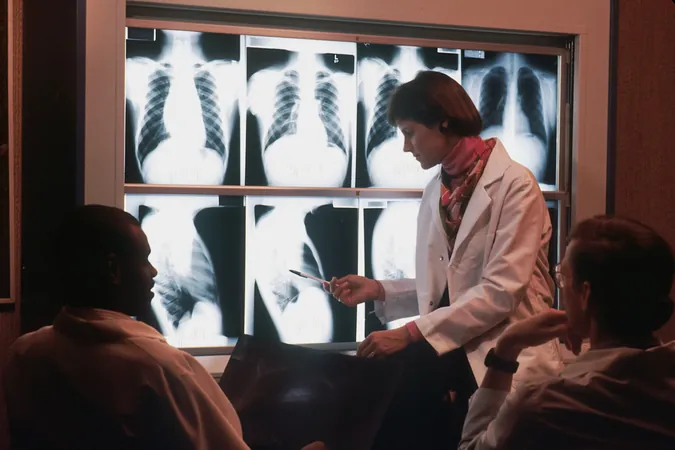
Shocking Breakthrough: Increased Chest X-Ray Usage Leads to Earlier Lung Cancer Detection and Higher Survival Rates!
2025-03-25
Author: Wei Ling
Introduction
A revolutionary study has uncovered a striking correlation between the frequency of chest X-ray referrals by General Practitioners (GPs) and the timely diagnosis and improved survival rates for lung cancer patients.
Study Overview
Conducted by researchers at the University of Sheffield, the study meticulously analyzed records from over 170,000 lung cancer patients across England between 2014 and 2018, integrating data regarding chest X-ray referral patterns from 7,400 GP practices. The findings, which were published in the prestigious British Journal of General Practice, reveal that patients visiting practices with the highest rates of chest X-ray usage were significantly more likely to be diagnosed with lung cancer at an earlier and more treatable stage, rather than at advanced stages three or four.
Survival Rates
Moreover, it was observed that these patients enjoyed better survival rates both one and five years post-diagnosis when compared with those from practices that conducted fewer X-rays.
Expert Opinions
Dr. Stephen Bradley, the lead author from the University of Sheffield's School of Medicine and Population Health, emphasized: "Lung cancer is the leading cause of cancer-related fatalities in the UK and around the world. Our research presents a vital step forward in enhancing the accuracy and promptness of lung cancer detection."
While advanced imaging technologies like CT scans are essential, Dr. Bradley advocates for better utilization of chest X-rays, a more accessible and cost-effective diagnostic tool. "By promoting the increased use of chest X-rays for patients displaying relevant symptoms, we can enhance early diagnosis rates, which is crucial for successful treatment outcomes," he added.
Historical Context
Historically, the benefits of GPs referring more patients for chest X-rays remained largely unacknowledged. The variable uptake of these X-rays among GP practices may stem from a reluctance based on skepticism regarding their effectiveness in diagnosing lung cancer in patients exhibiting common symptoms.
Significance of Research
Willie Hamilton CBE, co-author of the study and Professor of Primary Care Diagnostics at the University of Exeter, noted, “This research is critically important. There are few reliable and cost-effective cancer tests available in primary care, and our findings confirm that an increase in chest X-ray referrals results in earlier cancer detection—key to achieving optimal patient outcomes.”
Conclusion
This pioneering study offers a first-of-its-kind examination linking chest X-ray usage to the national cancer registry, marking a significant advancement in current medical understanding.
Lyndsy Ambler, Senior Strategic Evidence Manager at Cancer Research UK, stated, “This research underscores how primary care investigations can facilitate earlier cancer diagnoses, greatly enhancing patient outcomes. It is imperative that we encourage GPs to refer patients displaying potential signs of lung cancer for chest X-rays and ensure easy access to these essential diagnostics.”
With lung cancer claiming countless lives each year, this study's implications could be transformative. The medical community holds its breath, hoping that these insights will lead to a new era of enhanced early detection and survival for lung cancer patients.

 Brasil (PT)
Brasil (PT)
 Canada (EN)
Canada (EN)
 Chile (ES)
Chile (ES)
 Česko (CS)
Česko (CS)
 대한민국 (KO)
대한민국 (KO)
 España (ES)
España (ES)
 France (FR)
France (FR)
 Hong Kong (EN)
Hong Kong (EN)
 Italia (IT)
Italia (IT)
 日本 (JA)
日本 (JA)
 Magyarország (HU)
Magyarország (HU)
 Norge (NO)
Norge (NO)
 Polska (PL)
Polska (PL)
 Schweiz (DE)
Schweiz (DE)
 Singapore (EN)
Singapore (EN)
 Sverige (SV)
Sverige (SV)
 Suomi (FI)
Suomi (FI)
 Türkiye (TR)
Türkiye (TR)
 الإمارات العربية المتحدة (AR)
الإمارات العربية المتحدة (AR)